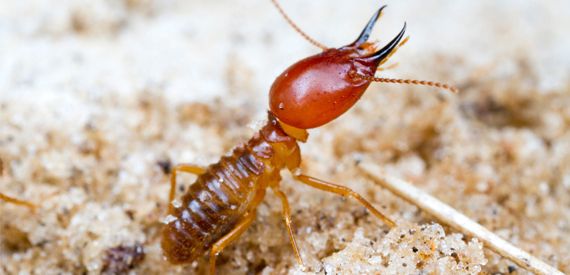Why Select Our Termite Control Services: Expert Solutions for Effective Defense
Ecological Effect of Pest Control: Harmonizing Efficiency With Sustainability
The ecological impact of insect control is a vital concern that calls for a fragile equilibrium between attaining effectiveness in handling insects and making sure sustainability of our environments. From the usage of harmful chemicals that seep into our soil and water to the unintentional repercussions on non-target types, the repercussions of standard parasite control practices are far-ranging.
Harmful Chemicals in Pest Control
The usage of hazardous chemicals in bug control postures substantial ecological and health and wellness dangers that require careful consideration and reduction approaches. Pesticides, pesticides, and herbicides are generally made use of to remove insects, however their extensive application can result in unintended effects. These chemicals can pollute soil, water sources, and the air, influencing not just the targeted insects yet likewise helpful pests, wildlife, and human beings.

To deal with these threats, incorporated pest management (IPM) strategies are being promoted as a more lasting choice. IPM involves a combination of methods such as organic control, habitat adjustment, and the targeted usage of chemicals as a last hope (ant control carrboro nc). By taking on an all natural technique to pest control, we can reduce the ecological and health and wellness impacts related to dangerous chemicals while effectively handling pest populaces
Effect On Non-Target Variety
Taking into consideration the unexpected repercussions of pest control methods, the influence on non-target types is a vital element that needs comprehensive analysis. While bug control steps intend to target details parasites, other microorganisms in the ecosystem may be unintentionally impacted. Non-target species, consisting of useful insects, birds, mammals, and also plants, can suffer indirect or straight injury from pesticide applications or organic control techniques.
Pesticides developed to battle a certain insect pest may harm pollinators like or all-natural predators such as ladybugs. Biological control representatives, if not species-specific, can position risks to unplanned targets, interfering with the ecological equilibrium.
To mitigate the effect on non-target types, incorporated parasite administration (IPM) methods that highlight an all natural strategy to pest control are advised. These techniques focus on using ecologically friendly techniques, reducing harm to useful microorganisms while successfully taking care of pest populations. Conducting comprehensive danger analyses and keeping an eye on the outcomes of bug control initiatives are important actions in securing non-target varieties and advertising total environment health and wellness.
Soil and Water Contamination
Unexpected ecological repercussions of parasite control approaches extend past affecting non-target species, with substantial implications for dirt and water contamination. Pesticides, herbicides, and chemical plant foods used in pest control can seep right into the soil and pollute groundwater, posturing a danger to both earthbound and aquatic communities. Soil contamination can disrupt the balance of microbes important for nutrient biking and plant growth, resulting in lowered dirt fertility and efficiency. These chemicals can persist in the setting for extensive durations, accumulating in the soil and potentially entering the food chain.
Water contamination is an additional critical concern associated with insect control techniques. To minimize dirt and water contamination from pest control activities, integrated pest administration approaches that focus on sustainability and lessen chemical inputs are essential.
Air Pollution From Pesticide Use
Exposure to air-borne chemicals during agricultural applications poses a considerable problem for air pollution control procedures. In addition, pesticide drift, where pesticides are carried by the wind to unintentional areas, can lead to the contamination of neighboring environments and water bodies.

Strategies for Sustainable Pest Control
In the world of farming practices, applying sustainable insect control approaches is vital for preserving environmental equilibrium and protecting crop yields. Sustainable insect control highlights using eco pleasant methods to manage bug populations successfully while decreasing harm to non-target organisms and ecological communities. Integrated Parasite Management (IPM) is an extensively taken on method that integrates organic, cultural, physical, and chemical control techniques to achieve lasting bug management options.
One trick approach in sustainable bug control is advertising biodiversity within agroecosystems. By boosting all-natural adversaries of bugs, such as killers and parasitoids, farmers can reduce the requirement for synthetic chemicals. Crop rotation and diversity are also reliable strategies to interrupt pest life cycles and produce much less positive problems for bugs to prosper. Furthermore, making use of pest-resistant crop ranges and utilizing techniques like trap chopping can help minimize insect pressure without counting heavily on chemical interventions. Eventually, by incorporating these lasting parasite control techniques, farmers can attain an equilibrium in between pest monitoring performance and environmental stewardship.
Conclusion
To conclude, the ecological effect of pest control techniques need to be thoroughly considered to stabilize performance with sustainability. Harmful chemicals used in pest control can cause dirt and water contamination, air contamination, and damage non-target species - termite control services. It is essential to execute sustainable parasite control strategies to decrease these negative results on the setting and advertise a healthier environment for future generations
By adopting a holistic technique to pest control, we can lessen the environmental and wellness effects linked with dangerous chemicals while properly handling pest populations.

To mitigate the air pollution created by chemical use, it is necessary to embrace integrated insect monitoring approaches that prioritize the use of non-chemical parasite control techniques, click for source such as plant rotation, natural killers, and immune plant ranges. Lasting pest control highlights the use of eco friendly techniques to take care of parasite populations properly while decreasing injury to non-target microorganisms and communities. Integrated Bug Monitoring (IPM) is an extensively embraced strategy that combines biological, cultural, physical, and chemical control approaches to attain lasting insect administration options.